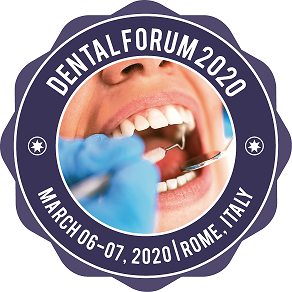
Biography
Biography: Deepti Khanna
Abstract
Most of the women in India do not visit the
den􀆟 st during pregnancy as they believe
they cannot take any medica􀆟 ons for 9 months.
However ,regular checkups and good dental health
habits can help keep you and your baby healthy. A
gesta􀆟 onal woman requires various levels of support
throughout this 􀆟 me, such as medical monitoring
or interven􀆟 on, preven􀆟 ve care and physical and
emo􀆟 onal assistance. Ge􀆫 ng a checkup during
pregnancy is safe and important for your dental
health. Not only can you take care of cleanings
and procedures like cavity fi llings before your baby
is born, but your den􀆟 st can help you with any
pregnancy-related dental symptoms you might be
experiencing.
Methods: A study was done on 50 pregnant women
for a period of 9 months to understand the dental
problems they face and the concerns they have for
visi􀆟 ng a den􀆟 st. A performa was given to them
during 6 weeks, 12 weeks , 20 weeks and 30 weeks
of pregnancy. They had to chose the problems
related to teeth which occurred at diff erent phases
of pregnancy.
Pregnant women may be more prone to cavi􀆟 es
for a number of reasons. If you’re eaô€†Ÿ ng more
carbohydrates than usual, this can cause decay.
Morning sickness can increase the amount of acid
your mouth is exposed to, which can eat away at the
outer covering of your tooth (enamel).
Pregnancy gingivi􀆟 s is a well recognized en􀆟 ty. Your
mouth can be aff ected by the hormonal changes
you will experience during pregnancy. For example,
some women develop a condi􀆟 on known as
“pregnancy gingiviô€†Ÿ s,” an infl ammaô€†Ÿ on of the gums
that can cause swelling and tenderness. Your gums
also may bleed a li􀆩 le when you brush or fl oss. Le􀅌
untreated, gingivi􀆟 s can lead to more serious forms
of gum disease. Your den􀆟 st may recommend more
frequent cleanings to prevent this.
Pregnancy does not cause periodontal disease
but it does worsen an exis􀆟 ng condi􀆟 on. Pyogenic
granulomas (pregnancy tumours) occur in about
1% to 5% of the pregnant women. In some women,
overgrowths of ô€†Ÿ ssue called “pregnancy tumors”
appear on the gums, most o􀅌 en during the second
trimester. It is not cancer but rather just swelling that
happens most o􀅌 en between teeth. They may be
related to excess plaque. They bleed easily and have
a red, raw-looking raspberry-like appearance.
If you’re pregnant and need a fi lling, root canal or
tooth pulled, one thing you don’t have to worry
about is the safety of the numbing medica􀆟 ons your
den􀆟 st may use during the procedure. They are, in
fact, safe for both you and your baby.
It is also safe to get an X-ray during pregnancy.
Although radia􀆟 on from dental X-rays is extremely
low, your den􀆟 st or hygienist will cover you with
a leaded apron that minimizes exposure to the
abdomen. Your dental offi ce will also cover your
throat with a leaded collar to protect your thyroid
from radia􀆟 on.
Results: Most of the pa􀆟 ents face morning sickness
in the fi rst trimester of pregnancy which demo􀆟 vates
them to start with any treatment. Fluoride treatment
may be needed for pa􀆟 ents with severe gastric
refl ux caused by nausea and vomi􀆟 ng during early
pregnancy, which can cause erosion of tooth enamel.
Pregnancy gingivi􀆟 s usually appears in the fi rst
trimester of pregnancy. This form of gingivi􀆟 s results
from increased levels of progesterone and estrogen
causing an exaggerated gingival infl ammatory
reac􀆟 on to local irritants. Coronal scaling, polishing
reac􀆟 on to local irritants. Coronal scaling, polishing
and root planning may be performed at any 􀆟 me as
required to maintain oral health. However, rou􀆟 ne
general den􀆟 stry should usually only be done
in the second and third trimester of pregnancy.
Acetaminophen, is the safest analgesic for use
during pregnancy. Local anesthe􀆟 cs are rela􀆟 vely
safe when administered properly and in the correct
amounts.
Conclusion: Op􀆟 mal oral health is very important
for the pregnant pa􀆟 ent and can be provided
safely and eff ec􀆟 vely. Paying a􀆩 en􀆟 on to the
physiologic changes associated with pregnancy,
prac􀆟 sing careful radia􀆟 on hygiene measures,
prescribing medica􀆟 ons on the basis of drug safety
categories and 􀆟 ming appointments and aggressive
management of oral infec􀆟 on appropriately are
important considera􀆟 ons. Given the possibility
that periodontal disease may aff ect pregnancy
outcomes, den􀆟 sts need to play a proac􀆟 ve role
in the maintenance of the oral health of pregnant
women

